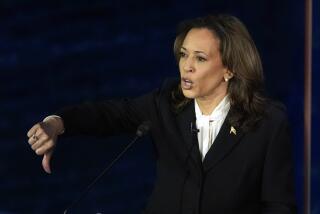Poland Needs a Cheerleader
- Share via
Lech Walesa’s latest plea for help sets up the West to take the rap if Poland fails to make pluralism work in the Soviet shadow. The view of the Solidarity union’s leader is intensely biased, but it has the same ring of truth you will find in the coldest, most impartial analysis of the situation and particularly of the odds against Solidarity’s rescuing a country pushed well along the road to ruin by communism without a lot of help from the outside. If President Bush and other Western industrial nations cannot figure out a way to help, they will have nobody but themselves to blame for missing Eastern Europe’s best chance to go free since World War II.
In neither Washington nor Kennebunkport, where the President has been vacationing, is there more than an occasional shuffling of feet in the right direction. One reason is that Bush’s instinct for the cautious path is more than reinforced by some senior officials who want to hold up action until they know more about the chances that reform will work for Poland. By Walesa’s standard, that approach is the most certain path to failure. He may well be right.
Money, or lack of it, probably has much to do with the Administration’s hesitant approach. People who asked during the Reagan years how letting the national debt pile up could cause serious trouble now have at least one answer. Helping Poland pull free of the Soviet field of gravity and start all of East Europe on new economic and political paths is the first and perhaps best chance the world has yet seen to end the Cold War. But America, with a debt of some $3 trillion, is having trouble putting together much more than $100 million toward the bargain price of such an historic event.
Some of the President’s advisers question whether Soviet President Mikhail S. Gorbachev can make it and therefore counsel against helping Poland too much. The theory is that a Gorbachev successor would clamp down on Poland and knock apart any rescue machinery the West might have set up.
The British magazine the Economist, as cautious in its analysis of affairs as it is carefree in its language, came to a different conclusion recently based on reports from a team of correspondents in Eastern Europe. “ . . . the case for drastic change is strong and the chances of being allowed (by Moscow) to get away with it are not bad,” the magazine said.
Walesa repeated this week that Poland needs $10 billion to get on its feet--the same number that circulated during Bush’s July visit to Poland--but he elaborated this time. Poland is not looking for all of that in cash, nor is it necessarily looking for all of the cash to come from governments.
“Come with your banks, your companies,” he said to the West. “I will provide a house for them. We are proposing a deal from which both you and us will profit . . . With $10 billion, you could connect Poland to Europe.”
But if the connection is not made, he said, “we will be set back for 20 or 30 years. But we will be able to openly accuse the West of not meeting Polish needs halfway, while Poles did everything they could.”
It must be difficult for Poles, hearing Americans boast that they are leading the rest of the world out of economic darkness, to believe that Americans are not rich enough to help Poland if they want to. Under the circumstances, the least that Bush could do for the Poles and others who want to follow them to freedom would be to act as a cheerleader with multinational corporations, as coordinator with other Western industrial nations, as friend to people who need one desperately.
More to Read
Sign up for Essential California
The most important California stories and recommendations in your inbox every morning.
You may occasionally receive promotional content from the Los Angeles Times.










